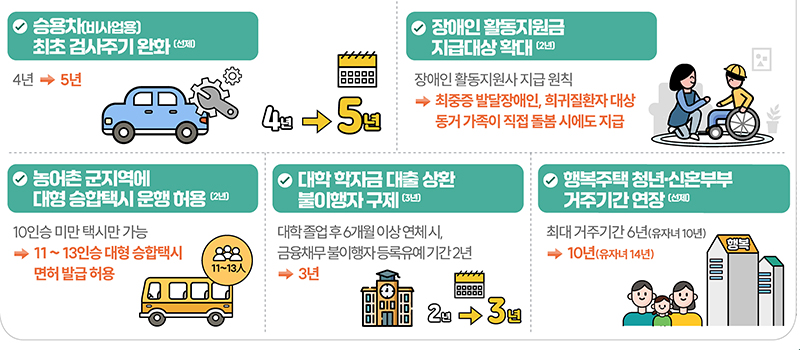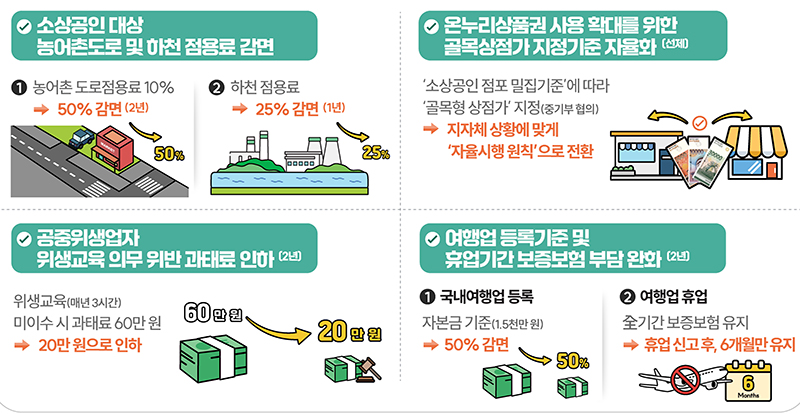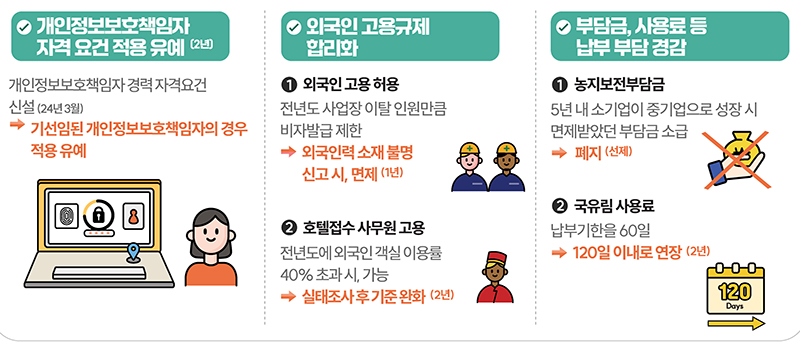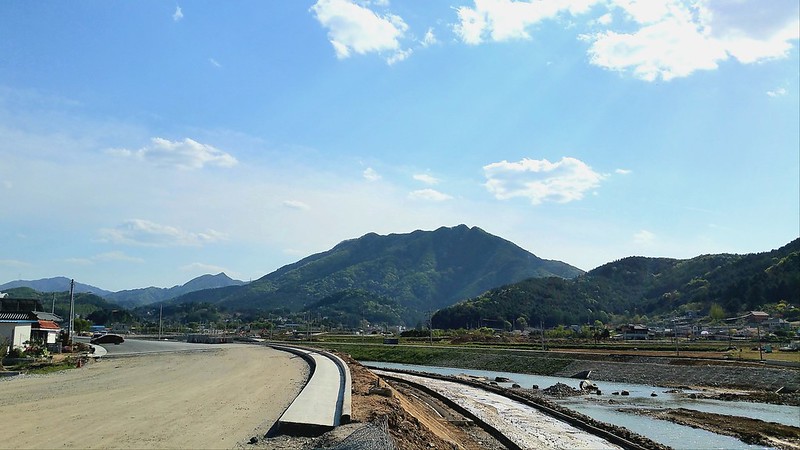Height limit for semiconductor industrial complex eased to 150m… Building expansion permitted
The government confirms and promotes 263 temporary regulatory suspensions in four major areas, including investment and entrepreneurship, lifestyle regulations, vitality of small and medium-sized businesses, and reduction of management burden.
Accordingly, the height limit for the semiconductor industrial complex will be relaxed from the existing 120m to 150m to allow building expansion, and the initial inspection of non-commercial passenger vehicles will be relaxed from 4 to 5 years.
In addition, the economic burden on small business owners will be reduced by reducing the occupancy fees for rural roads and rivers, and the burden of new appointments will be alleviated by providing a preparation period according to the strengthening of personal information protection officer qualifications.
Lee Jeong-won, the second deputy director of the Office for Government Policy Coordination, explained in a preliminary briefing on the ‘1st temporary regulatory suspension plan’ the previous day, “The government has decided to pursue this regulatory suspension based on the judgment that special measures are needed to improve the vitality of the people’s livelihood and economy.” .
He added, “In order to increase the on-site experience of regulatory innovation, we selected tasks focusing on regulations below the enforcement ordinance that can be quickly acted upon within the government.”
In particular, he emphasized, “We expect that this measure will create an economic effect of more than 4 trillion won within the current government’s term,” and added, “We plan to pursue the necessary measures with the goal of quickly completing them within the first half of the year.”
Meanwhile, the temporary suspension of regulations refers to easing, suspending, or granting special provisions to regulations for a certain period of time within the scope of maintaining the basis of existing policies, and has been implemented twice in 2009 (145 cases) and 2016 (54 cases).
And this temporary suspension of regulations is being promoted again for the first time in eight years in order to improve the vitality of the people’s economy and at the request of economic groups.
◆ Investment/startup promotion: 77 cases
Meanwhile, the floor area ratio of the semiconductor industrial complex was relaxed from 350% to 490%, making expansion possible, but expansion was restricted due to building height restrictions.
Accordingly, the height limit for the semiconductor industrial complex will be relaxed to 150m, which is 30m higher than before, to maximize process efficiency and increase sales due to the expansion of semiconductor production facilities.
In addition, in order to participate in public bidding, the issuance of a direct production certificate is permitted without a factory registration certificate, and e-commerce for products produced by resident companies, such as food and medical devices, is also permitted.
By easing the criteria for priority occupancy in type 1 port hinterland complexes, the occupancy of promising export companies will also increase, and the proportion of exports will be relaxed to 40% to increase the occupancy of promising export manufacturing and U-turn companies.

Main cases: 77 cases of investment/startup promotion (47 temporary, 30 preemptive) (detailed information is provided in the text)
◆ Innovation in living regulations: 65 cases
The initial inspection cycle for non-commercial passenger vehicles has been relaxed to 5 years after new vehicle registration, reducing the time and financial burden of inspection.
In addition, testing is possible from 90 days before the expiration date, and more than 10 testing stations will be expanded in urban areas such as Seoul.
By allowing the payment of activity support funds for the disabled even when caring for family members, the difficulties of caring for the disabled family members are resolved and the financial burden is reduced.
This is to ease the provision of subsidies to families of people with severe developmental disabilities or rare diseases, who are in short supply compared to the demand for activity support workers, when they provide direct care.
In particular, large shared taxis that can seat 11 to 13 people will be allowed to operate in county-level rural areas, improving the convenience of transportation for local residents and tourists.
Meanwhile, the grace period for registration of those who default on college student loan repayments will be extended to three years, and the maximum residence period for young people and newlyweds in Happy Housing will also be increased to 10 years (14 years for those with children).

Main cases: 65 cases of innovation in living regulations (49 temporary, 16 preemptive)
◆ Enhancement of vitality of small and medium-sized business owners: 66 cases
The reduction in occupancy fees for rural roads will be expanded from 10% to 50%, and the occupancy fee for rivers will be reduced by 25% to ease the financial burden on small business owners.
If a public sanitation business operator violates 3 hours of hygiene education, a fine of 600,000 won was imposed, but this is reduced to 200,000 won.
The designation of stores with a high concentration of small business owners who can use Onnuri gift certificates will be changed to the principle of autonomous implementation by local governments to revitalize local commercial districts.
In addition, for travel business registration, the capital base is reduced by 50%, and for travel business closures, guarantee insurance is maintained only for 6 months after reporting the closure.

Main cases: 66 cases of improving the vitality of small and medium-sized business owners (56 temporary cases, 10 preemptive cases)
◆ Reduction of management burden: 138 cases
For personal information protection managers already appointed as of the effective date of the new qualification requirements, the application of the newly established experience requirements will be postponed.
Permission to hire foreigners exempts visa issuance restrictions when employers report the whereabouts of foreign workers are unknown, and the standard for hotel reception staff to use foreigners’ room occupancy rate for the previous year is relaxed to 40%.
As the farmland preservation fee is due to increased sales due to business growth, retroactive collection of the fee will be abolished, and the payment deadline for the national forest use fee will be doubled from within 60 days to within 120 days.

Main cases: 138 cases of management burden reduction (111 temporary cases, 27 preemptive cases)
In order to quickly implement this temporary regulatory moratorium, the government plans to take necessary measures, such as comprehensive revision of the enforcement ordinance, with the goal of completing it within the first half of the year.
In addition, the implementation period of the temporary regulatory suspension is set at 2 years in principle, but is set flexibly in consideration of the characteristics of each task and is promoted. Two months before the expiration of the implementation period, the effects of deferment and relaxation for each task are comprehensively reviewed to determine whether extension, additional improvement, or loss of effect is possible. decide etc.
Deputy Director Lee said, “We will continue to mobilize the field-centered regulatory innovation system through various regulatory systems such as the Regulatory Reform Report, Regulatory Review System, and Regulatory Innovation Promotion Team to quickly resolve regulatory difficulties in the field.”
He emphasized, “At the same time, we will further accelerate the reform of killer regulations, which are critical regulations that hinder economic growth, and further increase the speed of regulatory reform.”
Inquiries: Regulatory Policy Office, Office for Government Policy Coordination (044-200-2916)
Office for Government Policy Coordination
Source: Policy news, link


Comments